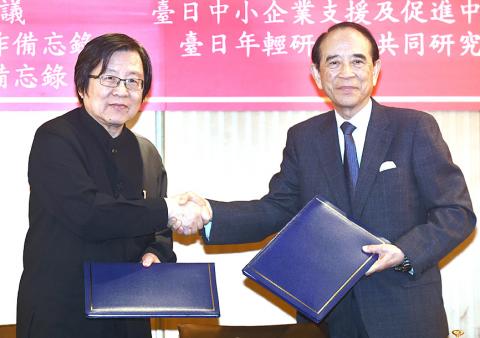Japan at a bilateral meeting reiterated its hope that Taiwan could lift an import ban on food products from five Japanese prefectures, but understands that Taiwanese voiced their collective opposition to the idea in a referendum last week, the Taiwan-Japan Relations Association said yesterday.
Japan said it hoped that Taiwan could lift the ban based on scientific evidence, association deputy secretary-general Lin Ching-hung (林慶鴻) told a news conference at the conclusion of the two-day annual Taiwan-Japan trade and economic meeting in Taipei.
“In response, we told our Japanese counterparts that according to the referendum results, Taiwanese only want Japanese food products that are safe to consume and that the government will handle the matter in accordance with the Referendum Act (公民投票法) and the Act Governing Food Safety and Sanitation (食品安全衛生管理法),” Lin said.

Photo: Liao Chen-huei, Taipei Times
An official who attended the meeting said that Japanese representatives also mentioned China’s decision on Wednesday to partially relax its import restrictions on Japanese food products imposed after the 2011 Fukushima Dai-ichi nuclear disaster, by allowing the import of rice produced in Niigata Prefecture, effective immediately.
The official spoke on condition of anonymity.
Beijing’s new policy came just days after a referendum initiated by the Chinese Nationalist Party (KMT) to maintain the import ban on Saturday last week received 7,791,856 votes in favor, representing 78 percent of votes cast, further tying the hands of the Democratic Progressive Party (DPP) administration, which has sought to relax the ban to bolster Taiwan-Japan relations.
Asked whether attendees had echoed Japanese Minister of Foreign Affairs Taro Kono, who on Thursday said that his government did not rule out taking the issue to the WTO, Lin answered in the negative.
Association Secretary-General Chang Shu-ling (張淑玲) said that it and the Ministry of Foreign Affairs would continue discussions with Japan about the referendum results and possible actions that Tokyo could take.
“We will do our utmost best to seek understanding on issues where the two sides have failed to reach a consensus,” Chang said, adding that neither Taipei nor Tokyo wants to see a single issue hindring the development of bilateral ties.
Trade and economic relations between Taiwan and Japan remain close and strong, she said, citing an agreement and four memorandums of understanding inked after the meeting.
However, Lin confirmed that the Taiwan-Japan Economic Partnership Committee, which was established in 2013 as a platform for discussing economic, trade and investment issues, has not been operational.
Then-minister of foreign affairs David Lee (李大維) in December 2016 said that the committee had been put on a back burner due to the import ban.
As for Taiwan’s oft-stated wish to accede to the Japan-led Comprehensive and Progressive Agreement for Trans-Pacific Partnership, Chang said that Taiwanese representatives tried to express that hope to their Japanese counterparts through different channels during the meeting.
“We hope that Japan could offer us more assistance, including through exchange of information,” she said.
Earlier, association President Chiou I-jen (邱義仁) and his Japanese counterpart, Japan-Taiwan Exchange Association Chairman Mitsuo Ohashi, signed an agreement on mutual recognition of authorized economic operators.
They also inked memorandums that promote joint research between young Taiwanese and Japanese academics, cooperation between the two nations’ small and medium-sized enterprises, exchange of information on granted patent applications and collaboration on quality management for medical equipment.

Taiwanese can file complaints with the Tourism Administration to report travel agencies if their activities caused termination of a person’s citizenship, Mainland Affairs Council Minister Chiu Chui-cheng (邱垂正) said yesterday, after a podcaster highlighted a case in which a person’s citizenship was canceled for receiving a single-use Chinese passport to enter Russia. The council is aware of incidents in which people who signed up through Chinese travel agencies for tours of Russia were told they could obtain Russian visas and fast-track border clearance, Chiu told reporters on the sidelines of an event in Taipei. However, the travel agencies actually applied

Japanese footwear brand Onitsuka Tiger today issued a public apology and said it has suspended an employee amid allegations that the staff member discriminated against a Vietnamese customer at its Taipei 101 store. Posting on the social media platform Threads yesterday, a user said that an employee at the store said that “those shoes are very expensive” when her friend, who is a migrant worker from Vietnam, asked for assistance. The employee then ignored her until she asked again, to which she replied: "We don't have a size 37." The post had amassed nearly 26,000 likes and 916 comments as of this

New measures aimed at making Taiwan more attractive to foreign professionals came into effect this month, the National Development Council said yesterday. Among the changes, international students at Taiwanese universities would be able to work in Taiwan without a work permit in the two years after they graduate, explainer materials provided by the council said. In addition, foreign nationals who graduated from one of the world’s top 200 universities within the past five years can also apply for a two-year open work permit. Previously, those graduates would have needed to apply for a work permit using point-based criteria or have a Taiwanese company

The Shilin District Prosecutors’ Office yesterday indicted two Taiwanese and issued a wanted notice for Pete Liu (劉作虎), founder of Shenzhen-based smartphone manufacturer OnePlus Technology Co (萬普拉斯科技), for allegedly contravening the Act Governing Relations Between the People of the Taiwan Area and the Mainland Area (臺灣地區與大陸地區人民關係條例) by poaching 70 engineers in Taiwan. Liu allegedly traveled to Taiwan at the end of 2014 and met with a Taiwanese man surnamed Lin (林) to discuss establishing a mobile software research and development (R&D) team in Taiwan, prosecutors said. Without approval from the government, Lin, following Liu’s instructions, recruited more than 70 software